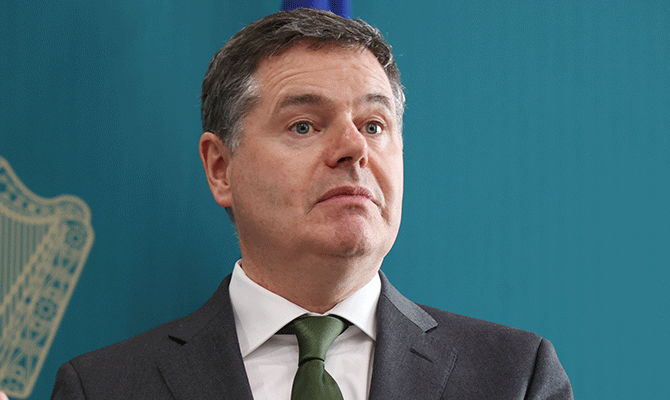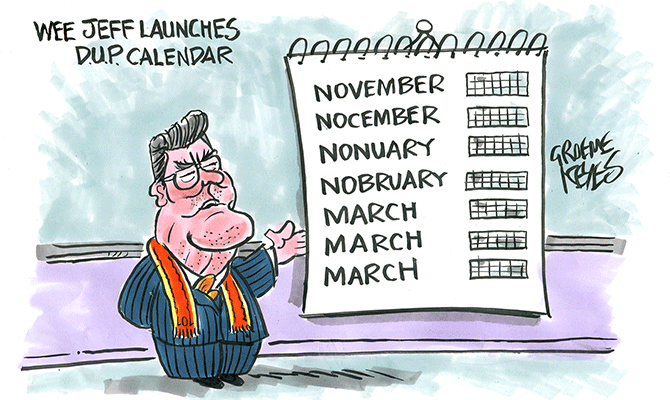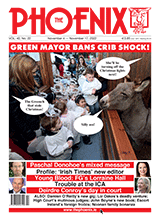
Paschal Donohoe
FINANCE MINISTER Paschal Donohoe told the Dáil in his Budget 2023 speech that he was reducing VAT on newspapers from 9% to zero. The minister was doing this, he explained in suitably grave tones, to assist media that were “holding those in power to account” and to “support an independent press”. The Phoenix was obviously pleased at this statement as it appeared to mean that the publication was, rightfully, being included in the VAT relief.
A specific, detailed reference to the zero-VAT measure was contained in Donohoe’s Department of Finance documentation under the heading: “Summary of 2023 Budget Measures”. This referred to the “application of a zero VAT rate for newspapers and news periodicals [Goldhawk’s italics], including digital editions”. The Phoenix is a news periodical.
Another finance department document, “Budget 2023 Tax Policy Changes”, said: “The VAT rate on newspapers and news periodicals will be reduced to zero from 9%”.
On the day of Donohoe’s budget speech, the Revenue Commissioners also described the new VAT rate of zero for “periodicals” in its Budget 2023 summary. That’s three references to “periodicals” – two of which were from Donohoe’s department, which clearly understood his budget speech remarks to include such publications.
However, when the Finance Bill was published on October 20, it referred to the new zero VAT rate as being applied to “newspapers”. There was no announcement from either the minister, the finance department or Revenue about this apparent U-turn on VAT relief for those who “hold power to account”.
The two major beneficiaries of the VAT relief measure are the Irish Independent and Irish Times, both of which have been pleading poverty in recent years as they lobbied for VAT reform. Both newspapers made millions during the pandemic, with Government wage subsidies and a raft of large-scale Government health advertising enriching both newspapers. Neither newspaper needs such financial relief, as evidenced by the fact that the IT was actually shamed into returning €3m to Government as it had made bumper profits during the last year for which its accounts were published.
In a triumphant article on how newspapers had “won their battle… to be zero-rated for VAT”, IT journalist Laura Slattery reported that the VAT announcement “was greeted with some cheering from the Dáil press gallery and Government benches”. What an interesting alliance – is this the Irish version of a Greek chorus?
Slattery also noted, by the way, that “it is not expected that the measure will be passed on to consumers in the form of lower cover prices or subscription charges”. A writer on media and business for the IT, Slattery knows what she is talking about here.
The Phoenix operates on a shoe-string budget compared to these titles and their companies and we can certainly claim to be trying to hold power to account. Meanwhile, those publications that concentrate on mainly attacking opposition politicians, as opposed to the government, are being gifted €39m (the cost in a full year) in VAT reform. Neither the Indo nor the IT can be described as hostile to the coalition Government – au contraire – and their long-term, concerted campaign of attacks on the largest opposition party, Sinn Féin, is manna from heaven to a Government under serious pressure.
Another anomaly is that the Irish editions of British and other foreign newspapers will also be receiving tax relief from the VAT measure, while Irish print publications such as The Phoenix, Village magazine and other disrespectful periodicals will continue to be penalised.
For many years government politicians, and even some in opposition, were accused by journalists of holding back on libel reform in order to keep the media compliant. That was the stick. VAT reform is the carrot. For The Phoenix, however, it is the stick alone from a desperate Government that can spend €11bn to placate a hostile electorate and €39m on its loyal media supporters. And yet the same ‘concerned’ Government parties deny small, independent publications such as The Phoenix some relief with relatively paltry amounts of money that can mean life or death to such publications in these critical times for media.




















